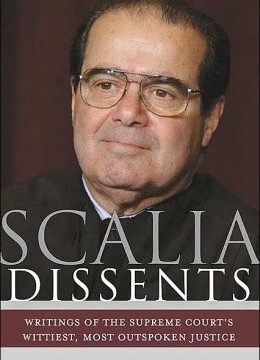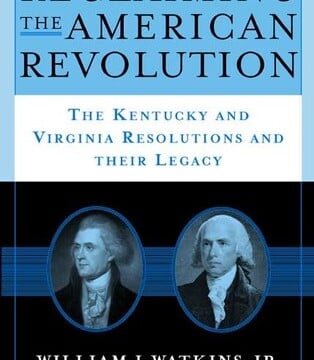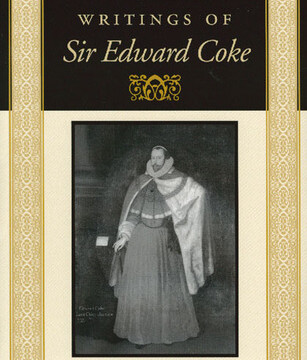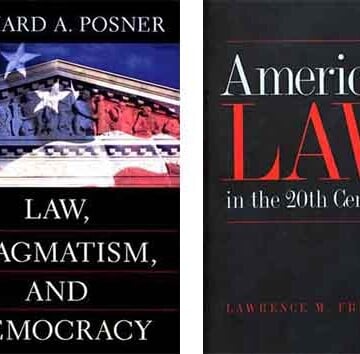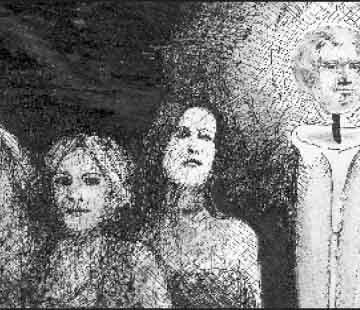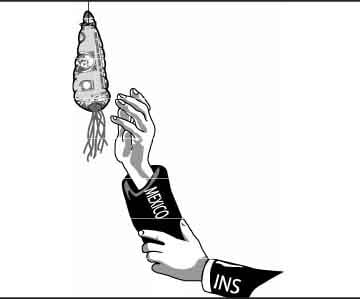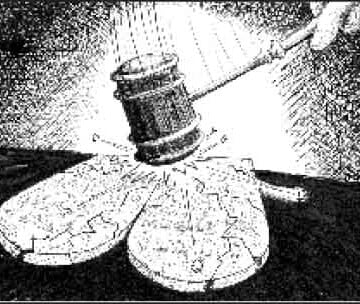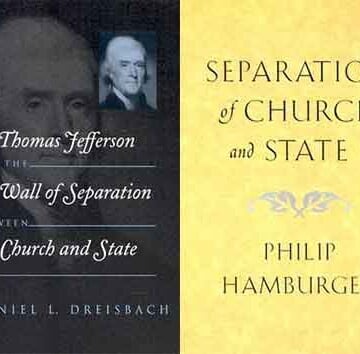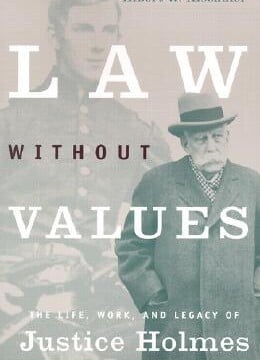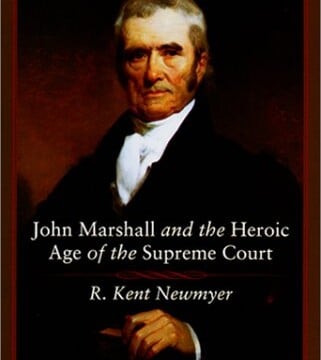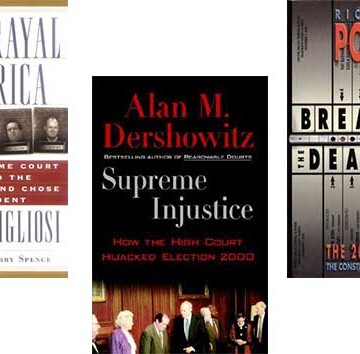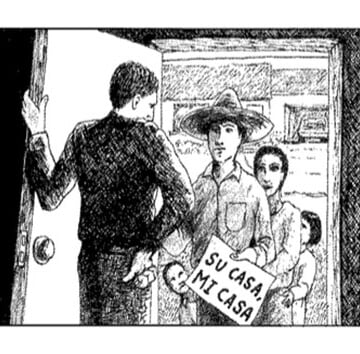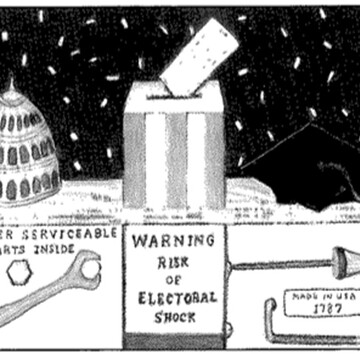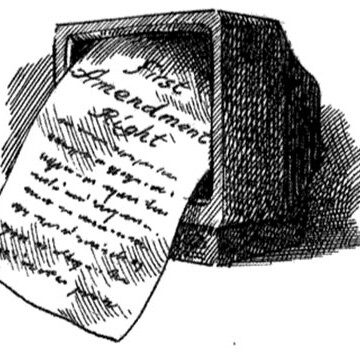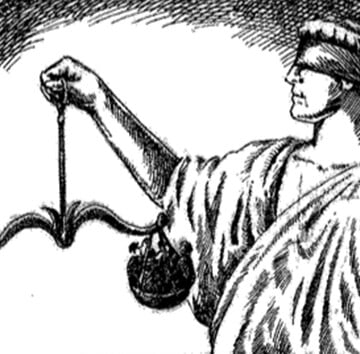Judge John Roberts of the U.S. Court of Appeals for the District of Columbia Circuit, whom President George W. Bush has nominated to take the place of retiring Associate Justice Sandra Day O’Connor, is what we used to call a “lawyer’s lawyer.” He comes from Harvard College, Harvard Law School, the Harvard Law Review, a...
Author: Stephen B. Presser (Stephen B. Presser)
Guantanamo Bay
Guantanamo Bay is the subject of continuous debate. Can the United States detain indefinitely members of the Taliban captured in Afghanistan, or Al Qaeda insurgents captured in Iraq, at our military base in Cuba? What sort of interrogation measures are permissible by international law in order to obtain information to protect Americans from the continuing...
My Favorite Justice
“Every virtue is included in the idea of justice, and every just man is good.” —Theognis John Paul Stevens is the only U.S. Supreme Court justice to have graduated from the law school where I teach; Steven Breyer was one of my law-school teachers; David Souter may be the most adept at arcane constitutional-law doctrine;...
A Hard Case
Terri Shiavo’s tragic struggle is a hard case, and hard cases, we are taught, make bad law. Her husband, Michael, believes she is in a permanent vegetative state and that she would not have wanted to be kept alive artificially. Her parents, however, believe that she stands a chance of recovery and, further, that, as...
Sacred Texts ’98
As readers of this delightfully passionate work will infer, the U.S. Department of Education is unconstitutional. Nevertheless, before it does the country a great service by abolishing itself, the department ought to issue a mandate requiring every secondary school in the nation to adopt the next edition of Reclaiming the American Revolution as required reading. ...
A Living Library of the Law Revived
“It is best that laws should be so constructed as to leave as little as possible to the decision of those who judge.” —Aristotle Here Lies Edward Coke, Knight of Gold, of Imperishable Fame, Spirit, Interpreter, and Inerrant Oracle of the Law, Discloser of its Secrets—Concealer of its Mysteries, Thanks Almost Alone to Whose Good...
Champion of American Believers
Carole Keeton Strayhorn, the Texas state comptroller, has become the new champion of American believers. Her office is charged with determining what groups qualify for exemption from state taxation (including sales taxes, property taxes, and other state levies) as religious organizations. My ancient Concise Oxford Dictionary defines “religious” as “Imbued with religion, pious, god-fearing, devout...
Erosion of Democracy
Brown v. Board of Education (1954), the famous decision of the Warren Court which held that racial segregation in the state public schools violated the 14th Amendment’s guarantee of the “equal protection” of the laws, turns 50 on May 17, 2004. The inevitable celebrations of the decision in the nation’s law reviews and popular media...
Marriage and the Law
The Massachusetts Supreme Judicial Court’s 4-3 ruling, in Goodridge v. Department of Public Health, that the Massachusetts constitution—if not the federal Constitution—requires the state to allow same-sex marriages has thrown nearly everyone into a good old-fashioned tizzy. The Massachusetts court somehow discovered that it was “arbitrary” and “capricious” and therefore legally impermissible to limit the...
The Unbearable Illegitimacy of American Law
For some time now, American law and lawyers have had a legitimacy problem. Most Americans must wonder how it is that unelected federal judges have the power to declare that no state government can punish consensual homosexual relations, prohibit abortion, or permit prayer in the schools (to mention just a few of the striking things...
Supreme Court Chaos
Nietzsche got it wrong. God is not dead, but that other mainstay of popular sovereignty and constitutional government in this country, the rule of law, is either finished or on life support. For decades the finest minds in the law schools and on the bench have argued that several hundred years of legal tradition, in...
Delayed Decision
Homosexual couples in the Bay State are awaiting the unexpectedly delayed decision of the Massachusetts Supreme Judicial Court as to whether they have a constitutional right to be married. This question may not have occurred to the Pilgrims at Plymouth Rock, but, as this issue goes to press, it is anybody’s guess how the court...
What Would Jefferson Do?
Are the Dixie Chicks traitors? Lead singer Natalie Maines boldly announced at a concert in London, just before the beginning of our recent armed incursion into Iraq, “Just so you know, we’re ashamed that the President of the United States is from Texas.” The firestorm that ensued involved coordinated radio boycotts of the Chicks’ music...
The Rights of Aliens
One way of telling the story of American culture and politics in the second half of the 20th century is to present it as a revolt against the group of white Anglo-Saxon Protestant males who dominated the country from the time of William Bradford to that of Dwight David Eisenhower. This narrative helps to explain...
The Federal Courts, a Menorah, and the Ten Commandments
A recent phenomenon in the United States is that no one knows any longer to what extent the country, our states, or our municipalities can participate in the display of such traditional religious symbols as crèches, crosses, menorahs, or even the Ten Commandments. Until the last half of the 20th century, no one seemed too concerned...
Metaphors Have Consequences
“The adulterous connection of church and state.” —Thomas Paine Is “separation of Church and State” a bedrock principle of the U.S. Constitution? Should it be? The answers of constitutional historians Daniel L. Dreisbach and Philip Hamburger fly in the face of conventional wisdom, embodied in such cases as Santa Fe Independent School District v. Doe...
A Bad Man’s View of the Law
Law professors rarely write books. When they write at all, they typically produce incomprehensible and heavily footnoted articles (usually unread) for obscure law reviews. It is even rarer to find a law professor who can write with flair about something of more than ephemeral interest. And it is rarest of all to find a law...
Appointing Supreme Court Justices
Michael McConnell, to use the overworked metaphor, is the “poster boy” for the Senate Democrats’ attempts to frustrate President Bush’s promise to appoint more Supreme Court justices like Antonin Scalia and Clarence Thomas. Scalia and Thomas are the two current justices who have most closely embraced a jurisprudence faithful to the understanding of the Framers,...
“Outside the Box, but Never Outside of the Constitution”
Is the Ashcroft Justice Department busily engaged in shredding the Constitution under the cover of September 11? We are, the President tells us, at war, and in war, we are often told, the first casualty is civil liberties. Some feared that this was the case when Attorney General John Ashcroft, in July, unveiled his TIPS...
Taking God Out of School
The Pledge of Allegiance, as this issue goes to press, is illegal for children in the public schools of Alaska, Arizona, California, Hawaii, Idaho, Montana, Nevada, Oregon, and Washington state to recite, because it contains the words “under God.” Two out of three judges on a panel of the U.S. Court of Appeals for the...
A Dissenting Voice
Judge Danny Boggs of the U.S. Court of Appeals for the Sixth Circuit is, for believers in the rule of law, a hero. Judge Boggs, in an extraordinary dissenting opinion published in May, revealed profound problems with the majority of his court’s approach to law in an affirmative-action case and pointed out that his chief...
Jefferson’s Cousin
There are probably more judicial biographies of Supreme Court Chief Justice John Marshall than of all the rest of the Supreme Court justices combined, so why another one? R. Kent Newmyer, historian and law professor at the University of Connecticut School of Law, undertook to write a work that would not mirror the standard hagiographical...
The Habitation of Justice
Judge Roy Moore, chief justice of the Alabama Supreme Court, is in big trouble again. Judge Moore’s first 15 minutes of fame happened when, as a lower-court judge, he refused to remove a plaque containing the Ten Commandments from the wall of his courtroom. The plaque, it was said, amounted to an impermissible establishment of...
Interpretative Gymnastics
The Federal government’s freestyle interpretive gymnastics did not end when the man who was uncertain regarding the meaning of “is” left office. On January 13, 2000, President Clinton appointed Victoria Wilson to fill a vacancy on the U.S. Civil Rights Commission, a roving band of allegedly independent and bipartisan officials tasked with the job of...
What Makes for Real Prosperity?
Supreme Court Justice Rufus Peckham put it best, in the Trans-Missouri Freight Association decision in 1897. Broadly interpreting the Sherman Antitrust Act as a means to reign in large economic organizations that had spun out of control, Peckham acknowledged that bigger businesses, because of economies of scale, could occasionally reduce prices to consumers. He went...
Some Dare Call It Justice
“Justice is a contract of expediency, entered upon to prevent men harming or being harmed.“ —Epicurus, Aphorisms According to leading members of the American law professoriate, the U.S. Supreme Court’s decision, on December 12, 2000, in Bush v. Gore was “lawless and unprecedented,” “not worthy of ‘respect,'” featured “sickening hypocrisy and...
Ideology in Judicial Selection?
President Bush, many of us believed, was preparing to appoint a set of jurists committed to the rule of law to the federal bench, but this has been thrown into doubt by Senator Jeffords leaving the Republican party. One of the immediate results of that move, which threw committee control of the Senate to the...
“Borking”
“Borking” is back. The eponymous activity first perpetrated on Judge Robert Bork when he was nominated for a seat on the United States Supreme Court is the practice of painting a proposed judicial appointee as consciously demonic, in order to excite particular interest groups to oppose his appointment. Some might oppose Borkees because of honest...
“We Hold These Truths”
Is the Declaration of Independence part of the federal Constitution? The short answer, of course, is “no.” For the Declaration to be part of the Constitution, it would have to have been included in the original document ratified by at least nine of the conventions held in the original 13 states between 1787 and 1789,...
No Big News
The Bush administration finishes its first four months in office, the big legal news is that there is no big news. There have been some hopeful signs: the appointment of John Ashcroft as attorney general; the appointment of Theodore Olson as solicitor general. Both are distinguished conservatives, the former associated with the Burkean wing of...
The Virtues of Property
Somewhere deep in their bones, Americans recognize that property is the paramount civil right—perhaps the paramount human right. Anyone who seriously studies American history, particularly that of the late 18th century, will discover that property, along with virtue, provided the foundation for American government. Indeed, the preservation of properly is arguably the chief reason we...
A Presidential Pardon
The Presidential Pardon of Marc Rich, the Belgian-born, naturalized American billionaire financier and fugitive who has renounced his U.S. citizenship and fled to Switzerland to avoid multi-million-dollar tax liability, evoked incredulous responses from many. Said New York’s Mayor Rudy Guiliani, “When I first heard about it, my— my reaction was, quite honestly, no. No. It’s...
Don’t Fix It Restoring
The Electoral College, as we used to learn and as readers of this journal will still be aware, was supposed to be a device for removing the choice of the president from the people. Rather than direct elections, which could lead to the nation’s chief executive being the best demagogue, we were supposed to have...
The Twilight Zone
The U.S. Supreme Court has put an end to five weeks of uncertainty. In the early days of December, in the twilight between the certification of George W. Bush as the winner of Florida’s electoral votes and the decision of the U.S. Supreme Court that the Florida Supreme Court was wrong to intervene, only one...
Law, Morality, and Religion
A paleoconservative thinks about the law the way Edmund Burke did. The basis of all law is the will of God or, to use the term employed by Blackstone (another hero of paleoconservatives), “natural law.” According to natural law as understood by Blackstone, Burke, and our late 18th-century American Founding Fathers (as paleoconservatives can still...
Can American Legal Education Be Fixed?
Something has gone radically awry with legal education and maybe even legal practice. For about a decade now, the loudest wailing over the state of affairs has come from Chief Judge Harry Edwards of the United States Court of Appeals for the District of Columbia, who wrote a landmark article in the Michigan Law Review...
Raoul Berger, R.I.P.
On September 23, we lost one of the great jurisprudential fighters for Truth, Justice, and the American Way. Berger, late Charles Warren Senior Fellow at Harvard University, former professor of law at the University of California’s Boalt Hall, one-time second concertmaster for the Cincinnati Symphony Orchestra, died at the age of 99. Berger’s career as...
Unexpected Effect
Joseph Lieberman’s selection as the first Orthodox Jew to run for vice president may have the unexpected effect of making it respectable again to maintain that the United States is a Christian country. Picking Lieberman as his running mate was the single most interesting thing Al Gore has done in his campaign for the White...
Commercial Speech and the First Amendment
For sheer incoherence, incomprehensibility, and outrageousness, nothing beats the United States Supreme Court’s First Amendment jurisprudence. The First Amendment is a fairly simple piece of constitutional law: It forbids the federal legislature from restricting freedom of speech, freedom of the press, freedom of religion, or from establishing a national religious sect. Unfortunately, in the 20th...
A Closely Watched Term
The Supreme Court’s closely watched October 1999 term came to an end on June 28, and its themes finally became clear: inconsistency, incoherence, and arbitrariness. On that last day, the Court released important decisions on abortion, aid to religious schools, and homosexual rights, and refused to intervene in the Elian Gonzalez case. The Supreme Court’s...
The Clinton Scandals
The Clinton scandals continue to gurgle below the surface of American politics and law, occasionally throwing up a polluted geyser. Kenneth Starr’s successor as independent counsel, Robert Ray, is still considering indicting the President when he leaves office; disbarment proceedings are under way against Mr. Clinton in his home state of Arkansas; and Linda Tripp,...
Clarifying Constitutional Law
The U.S. Supreme Court, many had hoped, would use this term to clarify constitutional law and move jurisprudence somewhat closer to the original understanding of the Constitution. The Court has yet to issue important opinions regarding school vouchers, partial-birth abortion, the Violence Against Women Act, and prayer at high school football games, but the latest...
Sensationalizing if Youth Violence
“Children killing children.” The very phrase is chilling. But what can the law do about a six-year-old who shoots and kills his first-grade classmate? According to our Anglo-American legal heritage of common law, not much. Children under the age of seven are presumed not to be able to know the difference between right and wrong,...
Dodging A Bullet
The U.S. Supreme Court, late in January, dodged a bullet by refusing to decide whether Maryland’s decision to close its public schools on Good Friday violated the First Amendment’s Establishment Clause. State and local Good Friday closing laws have been with us for many generations, but recently they have been challenged in the federal courts....
Voucher Plan
School vouchers violate the First Amendment of the Constitution—or so ruled federal District Judge Solomon Oliver, Jr., in early December. Cleveland’s voucher plan, authorized under state legislation, was nondenominational and permitted students, selected by lot, to choose a school participating in the program and to receive a grant from the state to subsidize the cost...
Arbitrary Nature of the Supreme Court
Pro-abortion and pro-centralization forces have won another victory in the battle over partial-birth abortion. As I detailed in this space last month, a three judge panel of the Seventh Circuit Court of Appeals, breaking with other federal courts, upheld Wisconsin’s and Illinois’ laws against the procedure in October 1999. Planned Parenthood, the misnamed Hope Clinic...
Our Constitution and Theirs
We here at Chronicles are Constitutional Fundamentalists. We swear allegiance to the Constitution of Hamilton, Madison, and Jay, and not the Constitution of Warren, Brennan, and Souter. We do not believe that the Constitution is a “living document” that must be altered by successive Supreme Court justices to keep pace with the times. The Constitution...
Back in the News
Partial-birth abortion is back in the news, and for the first time, there appears to be some hope for the pro-life side. Of all the extraordinary things that the United States Supreme Court has done in the past few decades, none matches its 1973 decision in Roe v. Wade. Justice Blackmun’s majority opinion articulated a...
The Teaching Evolution
The teaching evolution is back in the news, in a case that the media—with their usual sensationalism—are comparing to the Scopes trial of 75 years ago. On August 10, Steven Green, legal director of the Washington-based Americans United for Separation of Church and State, sent a letter to the Kansas State Board of Education, threatening...
Every Neighbor a Litigant
Goethe taught us that true happiness comes from being engaged with others in productive projects, and we have known since Plato and Aristotle that man is a social animal, but we would be hard put to reach these conclusions if our only guide were the current state of American law. Far too often the American...
